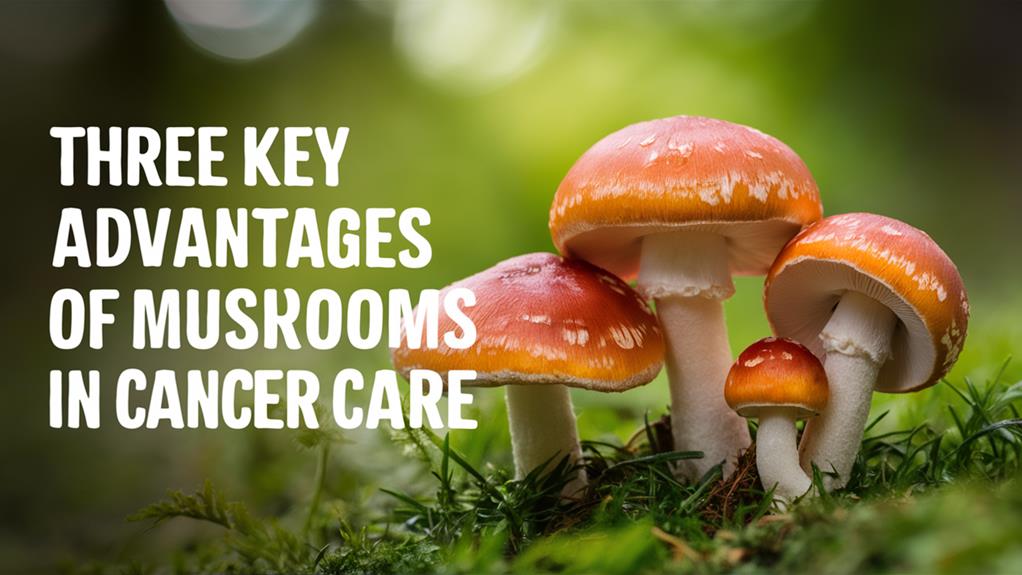
Mushrooms like turkey tail and reishi offer three important advantages in cancer care. First, they boost your immune system, enhancing the body's ability to fight cancer cells and recover from treatments like chemotherapy. Second, the polysaccharide-K (PSK) found in turkey tail mushrooms has been shown to improve survival rates and lower recurrence of cancer, making it a valuable adjunct therapy. Third, these mushrooms can help reduce the side effects of chemotherapy, improving your overall quality of life. Incorporating medicinal mushrooms into your routine could significantly benefit your cancer journey, and there's still more to discover about their advantages.
Overview of Medicinal Mushrooms

Medicinal mushrooms have gained attention in recent years for their potential benefits in cancer care. These mushrooms, including reishi, turkey tail, shiitake, and maitake, have been used for centuries in traditional medicine, especially in Asia.
Over 2,000 clinical studies have explored their anticancer properties, showing that they might inhibit cancer cell growth while enhancing immune function. Additionally, these mushrooms are packed with essential vitamins, minerals, and bioactive compounds like polysaccharides and triterpenes, which contribute to their therapeutic effects, including immune-boosting properties.
Key bioactive compounds in these mushrooms, particularly polysaccharides like beta-glucans, play a significant role in these effects. Some of these compounds have even been approved as cancer treatments in Japan. For instance, turkey tail mushrooms contain an active compound called PSK, which has demonstrated positive outcomes in clinical studies.
Patients with various cancers, such as gastric and colorectal, have shown improved immune function and survival rates after incorporating turkey tail into their care.
Moreover, the addition of medicinal mushrooms to cancer treatments may lead to a better quality of life for patients. Research indicates that mushrooms can help reduce chemotherapy side effects, improve appetite, and enhance both physical and mental well-being.
Role of Mushrooms in Cancer Treatment
When it comes to cancer treatment, mushrooms play a vital role in enhancing your immune system. They contain compounds that not only help inhibit tumor growth but also improve your quality of life during therapy.
For instance, reishi mushrooms are known to support cancer treatment through immune boosting and may induce cancer cell death while improving white blood cell activity, which is crucial for pathogen defense immune boosting properties.
Immune System Enhancement
Mushrooms play a significant role in enhancing the immune system, especially for individuals undergoing cancer treatment. They contain powerful compounds that boost your body's immune response, helping cancer patients better fight off illness.
For instance, medicinal mushrooms like turkey tail are rich in polysaccharides such as PSK, which improve the activity of immune cells like natural killer cells and T-cells. These cells are crucial for combating cancer effectively.
Furthermore, reishi mushrooms, known for their immune-boosting properties, significantly increase white blood cell activity and help manage immune suppression during cancer therapies, leading to better health outcomes and quality of life enhanced immune function.
Clinical trials have shown that PSK can enhance immune function and even improve survival rates in patients with various cancers, including gastric and breast cancer.
Additionally, consuming certain mushrooms can help repair immune cell damage caused by chemotherapy, reducing side effects like fatigue and nausea. Shiitake and maitake mushrooms also contain bioactive compounds that stimulate immune responses and promote the production of cytokines, which are essential for regulating immune activity in cancer patients.
Regularly including mushrooms in your diet may lead to an overall improvement in immune status, potentially contributing to longer survival and a better quality of life during treatment.
Embracing these health benefits can be a valuable part of your cancer care journey.
Tumor Growth Inhibition
While exploring complementary cancer treatments, you might find that certain mushrooms offer promising benefits in inhibiting tumor growth. Medicinal mushrooms like turkey tail and shiitake are rich in bioactive compounds called polysaccharides. These substances can enhance immune function in cancer patients and play a significant role in tumor suppression.
Here are three key ways mushrooms can help with tumor growth inhibition:
- Immune Boosting: Polysaccharide-K (PSK) from turkey tail mushrooms revs up immune cell activity, improving your body's ability to fight cancer.
- Clinical Evidence: Research shows that PSK can reduce recurrence rates and improve survival in various cancers, including gastric and breast cancers.
- Compounds at Work: Lentinan found in shiitake mushrooms stimulates your immune system and helps halt the spread of cancer cells.
Ongoing clinical studies continue to explore how these mushroom-derived compounds interact with cancer cell signaling, offering hope for overcoming drug resistance.
Quality of Life Improvement
Integrating medicinal mushrooms into cancer treatment can significantly enhance your quality of life. Studies show that mushroom extracts, like those from turkey tail and shiitake, can improve patients' tolerance to chemotherapy. This means you might experience fewer side effects, such as nausea and fatigue, allowing you to feel better during treatment.
Additionally, daily consumption of mushrooms can boost your overall physical and mental strength. Research indicates that patients who include mushrooms in their diet often report better appetite and emotional well-being. These factors are essential for maintaining energy and resilience throughout your cancer journey.
Moreover, evidence suggests that mushrooms can stimulate immune responses, which not only help manage cancer symptoms but also support a stronger recovery after treatment. With less chemotherapy-related fatigue, you can enjoy better daily functioning and life satisfaction.
Incorporating mushrooms into your diet can be a simple yet effective way to improve your quality of life during this challenging time. By focusing on both physical and emotional health, medicinal mushrooms can play a vital role in your cancer care plan.
Immune System Support
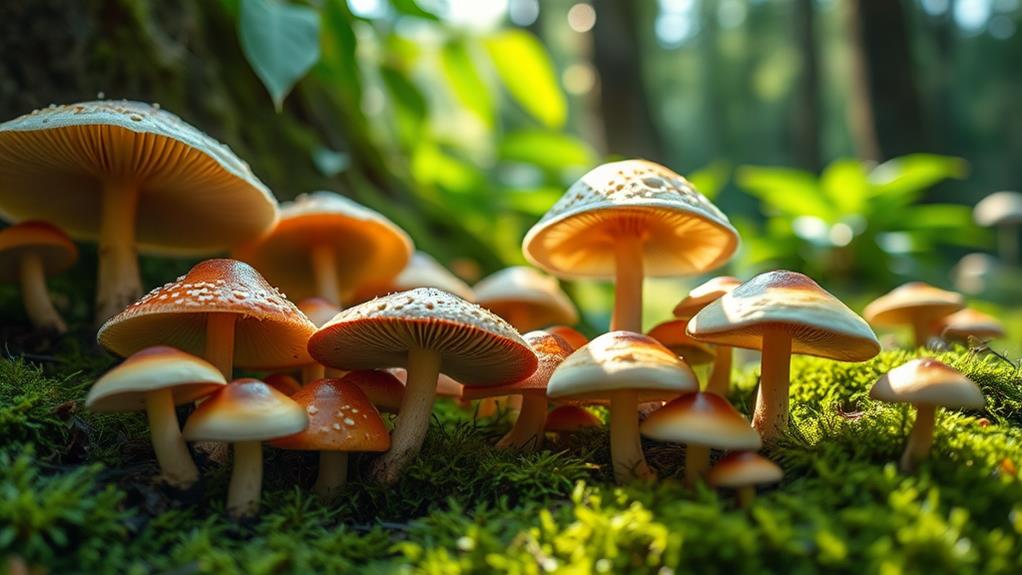
Boosting your immune system can be a vital part of cancer care, and certain mushrooms play a significant role in this process. Mushrooms, especially turkey tail, contain polysaccharides that enhance immune cell activity, supporting your body's fight against cancer.
Here are three powerful benefits of incorporating mushrooms into your diet:
- Natural Killer Cells: Polysaccharides help activate these crucial cells, improving their ability to target and destroy cancer cells.
- Repairing Immune Damage: Clinical studies show that mushrooms can help repair immune cell damage caused by chemotherapy, which is essential for recovery.
- Reducing Recurrence Rates: Regular mushroom consumption can enhance your immune system, potentially lowering the chance of cancer returning after treatment.
Additionally, the selenium and vitamin D found in mushrooms are vital for maintaining your immune system's optimal function. This helps prevent cell damage and inflammation during cancer treatment.
Polysaccharide-K (PSK) Benefits
Mushrooms offer more than just immune support; they also provide specific compounds that can significantly enhance cancer treatment outcomes. One such compound is polysaccharide-K (PSK), derived from the turkey tail mushroom. For over 30 years, PSK has been recognized in Japan as an effective adjunct therapy, especially for gastric, breast, colorectal, and lung cancers.
Studies show that PSK boosts immune function by improving the activity of natural killer cells and T-cells, which are essential for fighting cancer. In fact, a review of trials involving over 8,000 cancer patients found that PSK treatment is linked to improved survival rates and lower recurrence across various types of cancer.
In gastric cancer patients, PSK even helps repair immune cell damage caused by chemotherapy, further enhancing survival rates.
When used alongside conventional therapies like chemotherapy and radiation in lung cancer treatment, PSK has demonstrated a positive impact on both survival and quality of life.
Clinical Evidence for Efficacy
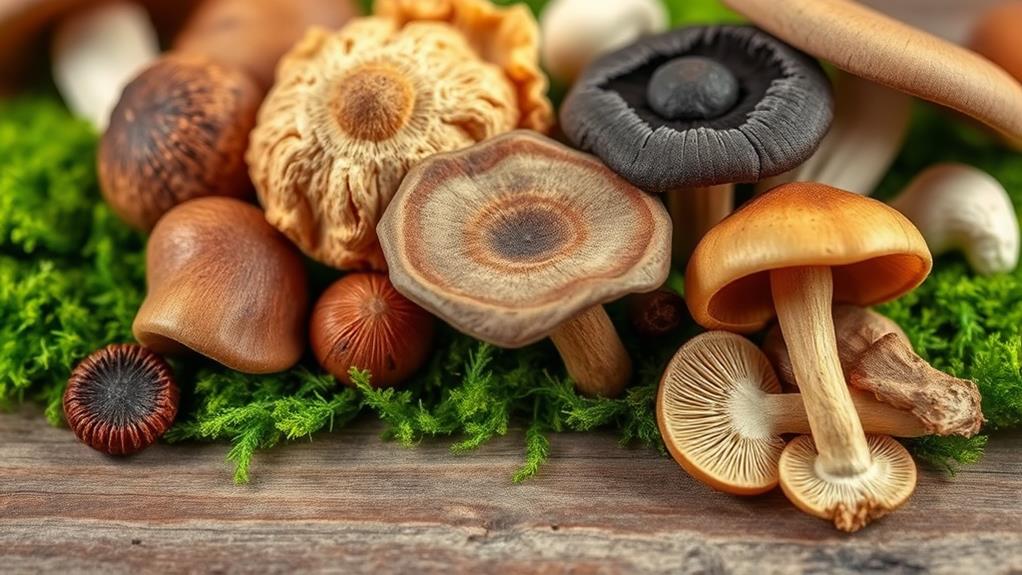
Evaluating the clinical evidence surrounding polysaccharide-K (PSK) reveals a compelling case for its efficacy in cancer care. Research shows that PSK, derived from turkey tail mushrooms, enhances immune function, leading to better outcomes for patients battling various cancers.
Here are three key findings from clinical studies:
- PSK administration improved survival rates in gastric, breast, colorectal, and lung cancer patients when combined with standard therapies.
- A large review involving 8,009 patients indicated that those with colorectal cancer experienced reduced recurrence when treated with PSK.
- Lung cancer patients who received PSK reported not only extended survival but also a better quality of life compared to those on standard treatments alone.
These studies highlight the powerful role mushrooms can play in cancer therapy, acting as effective adjuncts to conventional treatments.
The bioactive compounds in mushrooms, like lentinan and triterpenoids, stimulate immune responses and inhibit tumor growth, showing significant promise.
By integrating mushrooms into your cancer care routine, you may improve your immune system and enhance your overall treatment experience.
The evidence clearly supports the potential benefits of mushrooms in supporting patients through their cancer journey.
Safety and Side Effects
When considering the use of polysaccharide-K (PSK) derived from turkey tail mushrooms in cancer care, it's crucial to understand its safety and potential side effects. Research from Japan shows that PSK has a generally favorable safety profile for cancer patients, with few side effects reported.
However, you should be aware that some individuals might experience gastrointestinal discomfort or allergic reactions, especially if they've a history of mushroom allergies.
While consuming medicinal mushrooms is usually safe, it's important to note that excessive intake of certain mushrooms could lead to mild to moderate liver or kidney toxicity. This means you need to be cautious about the dosage you take.
The FDA doesn't approve turkey tail or other medicinal mushrooms for cancer treatment in the U.S., so consulting with your healthcare provider before use is essential.
Additionally, the quality of mushroom supplements can vary due to the lack of regular FDA review. This variability can pose risks, making it vital to choose reputable sources for these products.
Regulatory Status of Mushroom Supplements
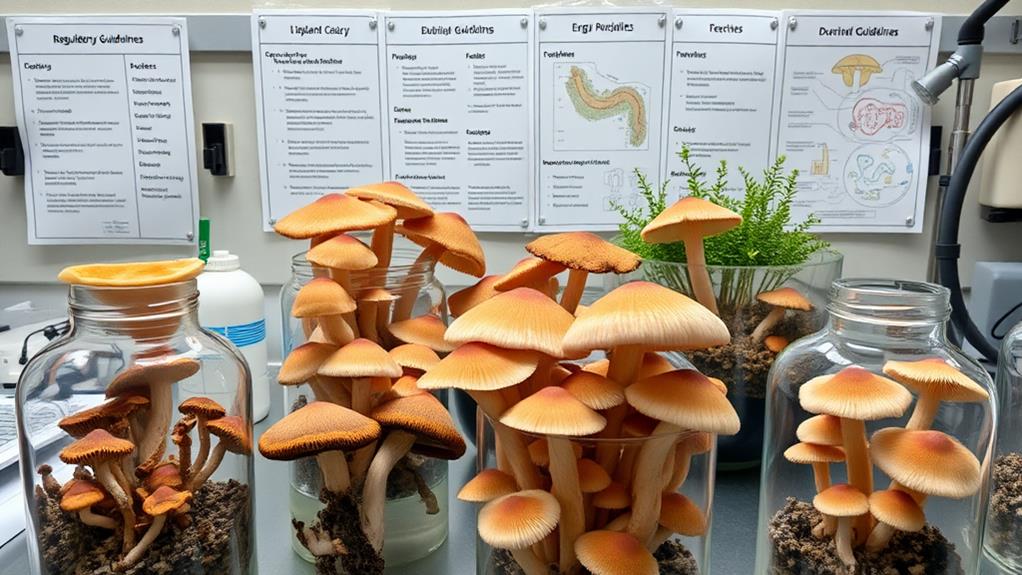
Navigating the regulatory landscape of mushroom supplements can be challenging, especially since turkey tail mushrooms and their extract PSK aren't FDA-approved for cancer treatment in the U.S.
While these mushrooms have shown promise in Japan, you should be aware of the regulatory status surrounding them here.
The FDA treats dietary supplements, including mushroom supplements, differently from pharmaceuticals. This means they ensure safety and truthful labeling, but they don't regularly review the quality of these products.
Here are three important points to consider:
- Quality Variability: There's significant variability in the quality and potency of mushroom supplements available on the market.
- Cautious Claims: Many manufacturers make bold claims about health benefits, but these may lack scientific evidence.
- Need for Research: Despite their use in traditional medicine, mushrooms like reishi and maitake still require further research and clinical trials for FDA approval.
Complementary and Alternative Approaches
Many patients exploring cancer care options are increasingly turning to complementary and alternative approaches, such as medicinal mushrooms. These unique fungi, especially varieties like turkey tail and reishi, offer significant benefits when paired with conventional treatments.
Research shows that mushrooms can enhance your immune system, helping your body fight cancer more effectively. For instance, polysaccharide-K from turkey tail mushrooms has been linked to improved survival rates and reduced recurrence in patients undergoing standard therapies.
Additionally, mushrooms can alleviate the side effects of chemotherapy, such as nausea and fatigue. By minimizing these uncomfortable symptoms, they can significantly improve your quality of life during treatment.
Some studies even suggest that consuming about 18 grams of mushrooms daily may lower your potential cancer risk by as much as 45%.
As more clinical trials explore the safety and efficacy of mushroom-based supplements in cancer care, their role in complementary and alternative therapies continues to gain recognition.
Recommended Varieties for Cancer Care
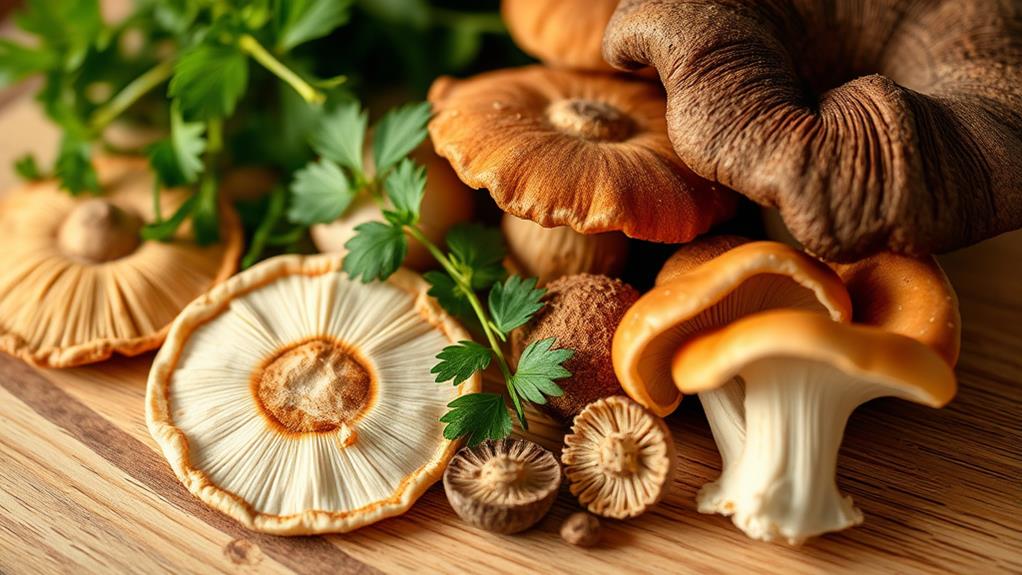
Incorporating specific mushroom varieties into your cancer care regimen can enhance your treatment outcomes and overall health. Here are three mushrooms you should consider adding to your diet:
1. Turkey Tail: This mushroom is packed with the active compound PSK, which helps boost your immune system and improve survival rates for various cancers, including gastric and colorectal cancers.
2. Shiitake Mushrooms: Known for containing lentinan, Shiitake mushrooms may stimulate your immune system and improve cancer treatment outcomes.
While more research is needed, many people find them beneficial while undergoing therapy.
3. Reishi: Often called the "mushroom of immortality," Reishi has been used in traditional medicine for its immune-boosting properties.
It shows promise as an adjunct therapy when combined with chemotherapy, potentially enhancing your overall treatment experience.
Future Research Directions
As we look to the future of mushroom research in cancer care, it's important to focus on emerging therapeutic compounds and their potential benefits.
You should consider how understanding the mechanisms of action behind these mushrooms might help overcome challenges like drug resistance.
Additionally, expanding clinical trials to include various populations and cancer types will give us a clearer picture of how mushrooms can effectively support cancer treatment.
Emerging Therapeutic Compounds
Research into mushrooms as a source of emerging therapeutic compounds is rapidly gaining traction in the realm of cancer care. Scientists are uncovering bioactive compounds like polysaccharides and triterpenoids that show promising anticancer properties.
Mushrooms such as Trametes versicolor (turkey tail) and Lentinula edodes (shiitake) are already recognized for their capabilities in clinical settings, particularly in Japan.
Here are three key reasons why you should pay attention to this research:
- Boosting the Immune System: Certain mushroom compounds help strengthen your immune system, making it more effective against cancer cells.
- Inhibiting Tumor Growth: These compounds can target crucial cellular pathways, potentially stopping tumors from growing.
- Reversing Drug Resistance: There's hope that mushroom-derived substances can help overcome multidrug resistance, enhancing the power of traditional chemotherapy.
Future clinical trials are essential to validate these findings and explore the synergistic effects of mushrooms used alongside existing therapies.
These studies could lead to groundbreaking advances in cancer treatment, offering new hope to patients and their families. As research progresses, the therapeutic potential of mushrooms could reshape how we approach cancer care.
Mechanisms of Action
Understanding the mechanisms of action behind medicinal mushrooms like Trametes versicolor and Lentinula edodes is crucial for unlocking their full potential in cancer care. These mushrooms contain bioactive compounds, including polysaccharides and triterpenoids, which play a significant role in targeting key signaling pathways involved in cancer progression.
By understanding how these compounds interact with cancer cells, researchers can develop therapies that minimize toxicity while maximizing effectiveness.
Current studies focus on how mushrooms can reverse P-glycoprotein (Pgp)-mediated multidrug resistance (MDR) in tumors. This research is vital, as it could enhance the effectiveness of conventional chemotherapy agents like paclitaxel and doxorubicin.
Moreover, polysaccharides from these mushrooms can stimulate immune responses, activating natural killer cells, T cells, and macrophages. This immune boost may improve the overall health of cancer patients undergoing treatment.
Future research will explore the synergistic effects of mushroom-derived compounds combined with existing cancer therapies, validating their potential as adjunct treatments.
Clinical Trial Expansion
The landscape of cancer treatment is shifting as clinical trials ramp up to investigate the potential of various mushroom species, including Omphalotus illudens and Ganoderma lucidum, in battling different cancers.
These ongoing studies are crucial for validating the efficacy of mushrooms as adjunct therapies in cancer care. Here are three reasons why this exploration matters:
- Non-Toxic Options: There's a pressing need for non-toxic treatments as drug resistance rises in conventional chemotherapy.
- Bioactive Potential: Understanding the molecular targets of mushroom compounds, like polysaccharides and triterpenoids, can reveal their anticancer mechanisms.
- Global Interest: With a growing interest in medicinal mushrooms, further research could fill critical gaps in our knowledge of their benefits.
The integration of mushroom-derived drugs into clinical settings is essential, but it requires solid evidence from preclinical and clinical studies to ensure safety and efficacy.
As you follow the advancements in clinical trials, remember that this research could pave the way for innovative therapies, providing hope for many facing cancer.
Conclusion
Incorporating mushrooms into cancer care can offer significant benefits, from boosting your immune system to providing essential compounds like Polysaccharide-K. As the saying goes, "An ounce of prevention is worth a pound of cure." By exploring the potential of medicinal mushrooms, you can take proactive steps in your health journey. While research continues, the evidence so far highlights their promise in supporting treatment. Don't hesitate to consider these natural allies in your fight against cancer.
